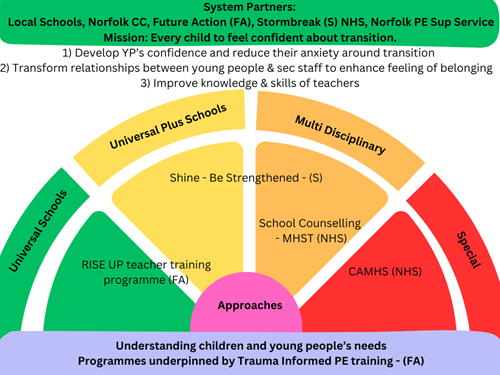Navigating the Transition: A Trauma-Informed Approach from Primary to Secondary Schools
Future Action and stormbreak CIO have a shared goal. To make a difference in the lives of children and young people, through better mental health and emotional wellbeing. More than ever, schools are having to respond to a growing crisis in mental health. Over the coming months, stormbreak and Future Action will be collaborating as part of a multi-agency approach on the Norfolk RISE Up Transition pilot. Our focus will be to train some brilliant educators in Norfolk and bring together primary and secondary colleagues to help children manage the upcoming move to their secondary school.
Transitioning from primary to secondary school marks a significant milestone in a child's life. While it's often an exciting time filled with anticipation, it can also be a period of anxiety and stress, particularly for children who have experienced trauma or adverse childhood experiences (ACEs). Recognising the importance of a trauma-informed perspective during this transition is crucial for supporting the wellbeing and success of young learners.
Here are some key considerations from such a perspective:
1. Building Confidence:
One of the fundamental pillars of a trauma-informed approach is creating a sense of safety and security. Helping children build confidence can serve as a protective factor against the anxieties associated with transitioning to a new school environment. We can help young people construct their container of safety as part of transition preparation in Year 5 and 6. This can involve identifying and providing access to emotionally available adults whom children can trust and confide in, as well as establishing safe spaces within the school, such as a designated sports sanctuary where they can retreat if feeling overwhelmed.
2. Breaking the Fall:
Transitioning to secondary school can be perceived as a significant upheaval, particularly for children who have already experienced trauma and may be losing their trusted adult in their primary school. By identifying these children early on and connecting them with trusted adults in their new setting, we can help mitigate the impact of the transition. Primary schools play a crucial role in facilitating this process by sharing key information with their secondary counterparts, such as student profiles and preferred coping mechanisms. This enables secondary school staff to quickly establish rapport, monitor, and provide tailored support to vulnerable students.
3. Creating a Sense of Belonging:
We all have a need to feel safe and to belong. A sense of belonging is essential for fostering resilience and wellbeing in children, especially during times of transition. Inclusive team sport festivals and activities can help children and teaching staff forge meaningful connections, feel comfortable in their new environment, and have fun together as soon as possible.
4. Sharing Knowledge and Strategies:
Primary schools possess a wealth of knowledge and successful strategies accumulated over years of investment in their students and families. By sharing this information with secondary schools, they can ensure continuity of support and prevent the loss of valuable success strategies.
We encourage primary schools to focus on building students' confidence, sharing information and planning for students' success. For secondaries, we encourage schools to prioritise creating a psychologically safe environment, being intentional about creating brilliant relationships and fostering a sense of belonging in the young person as soon as possible. Collaboration between the two ensures a seamless transition that prioritises the wellbeing of the child.
Implementing a multi-layered approach to intervention, including universal transition preparation for all students, targeted support for those at risk of school refusal in the future, and multidisciplinary assistance for those with complex needs, can ensure that every child feels valued, prepared and included. Movement can make it fun and create a brilliant 3rd object to build relationships and help young people feel safe and open up.

Neil Moggan is passionate about transforming children’s life chances. He was a Director of Sport, Health, and RSHE at an inner city secondary school where there was a 13 year life expectancy difference for children depending on what side of the road they were born on outside the school. Neil is now founding director of Future Action and partners with over 150 schools around the world training teachers to transform wellbeing outcomes. Neil advocates for a trauma informed workforce in a post lockdown education world. www.futureaction.co.uk


